
Back in October of 2002, Westword, a newspaper out of Boulder, Colorado. published a full front page story on B.C. Tours (a company my friends and I started). The reporter, David Holthouse, interviewed each of us separately. During our interview he asked me a surprising and off-topic question: how do you justify God commanding the Israelites to kill everyone in the Promised Land? This is a question I've been asked before, so I had an answer, albeit a brief one, at the ready. Surprisingly, this exchange made it into the article.
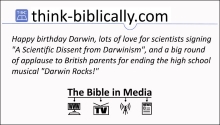
"Media" used to mean "print media" like books and newspapers, but the world has grown. Today media can also mean radio, television and movies delivered to personal computers, tablets and cell phones. As the world's best selling book of all time the Bible continues to make headlines, both good and bad, across all forms of media. Happy birthday Darwin, the racist "fake-science" writer, lots of love for those scientists signing "A Scientific Dissent from Darwinism", and big round of applause to British moms and dads for ending the high school musical "Darwin Rocks!" and a look at other possible fake science issues.

The environmentalists having been telling us since the 1950's that the end of the world is only 20 years away, and modern researchers claim we should be more concerned about the shifting of magnetic north which is happening faster than ever expected. For some the rising global population is the world's biggest problem, for others it is hunger and a lack of drinking water. In industrialized nations one often hears that the proliferation of nuclear weapons ought to be our biggest concern along with international terrorism and war. So what is the biggest problem facing the world? Surprisingly, none of these.
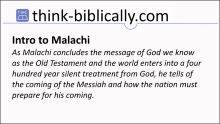
From the very beginning the prophet tells us this is going to be a troublesome book. His use of the word “oracle,” which means “burden,” tells us that much. And while, as is customary for the prophets, there is a hope threaded through the book there are also numerous chastisements for Israel’s sins. And their sins were many. Malachi denounces their blemished offerings, ignoring the tithe, divorces, marriages to foreign women, and many others. But they were guilty of much more, including selling of their children into slavery, the prostitution of their daughters to pay debts, and ignoring the Sabbath.
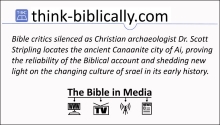
"Media" used to mean "print media" like books and newspapers, but the world has grown. Today media can also mean radio, television and movies delivered to personal computers, tablets and cell phones. As the world's best selling book of all time the Bible continues to make headlines, both good and bad, across all forms of media. Bible critics are silenced as Christian archaeologist Dr. Scott Stripling locates the ancient Canaanite city of Ai, proving the reliability of the Biblical account and shedding new light on the changing culture of the Near East in general and of early Israel in particular.

The first time someone tried quoting the Bible to me with a phrase found nowhere in Scripture was high school. In order to curb my evangelistic enthusiasm the assistant principal told me to "Do as the Bible says and 'when in Rome, do as the Romans do'". When I pointed out that wasn't in the Bible, she doubled down saying, "Oh it is, I think you need to read your Bible more." Yeah. The actual origin of the phrase is credited to Saint Ambrose, the bishop of Rome in 387 B.C. So no, it is not in the Bible.
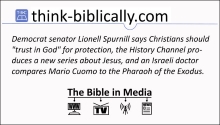
"Media" used to mean "print media" like books and newspapers, but the world has grown. Today media can also mean radio, television and movies delivered to personal computers, tablets and cell phones. As the world's best selling book of all time the Bible continues to make headlines, both good and bad, across all forms of media. Democrat senator Lionell Spurnill says Christians should "trust in God" for protection, the History Channel produces a new series about Jesus, and an Israeli doctor compares Mario Cuomo and New York's new abortion law to the Pharaoh of the Exodus.
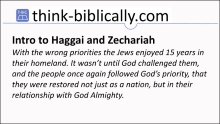
Haggai is the first prophet to the returning exiles. A lot of significant history has passed to reach this point in Israel's life, including the end of the Babylonian Empire, the rise of the Persian Empire, the absence of a Jewish nation, and now the resurgence of Jewish nationalism and the beginnings of a national restoration. The chart below offers a timeline-like understanding of the significant events, and a chronological placement of both the major prophets (marked with an •) and the minor prophets. The prophets are divided as such not because some were "greater", but simply by the length of their writings.

This marks the start of a prolonged series on the Gospel of Luke. As we’ve already examined the book of Acts, it seems reasonable that the first Gospel we study should be Luke as both share a common author. Ask anyone to compare the gospels and two facts will almost always be mentioned: (1) that John is the Gospel of Love, and (2) that Luke is the Historical Gospel. While it is true that John gives us a look into Jesus’ personal struggles and relates stories not contained in any other gospel account, it is not true that Luke is purely a historical account.
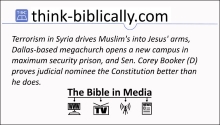
"Media" used to mean "print media" like books and newspapers, but the world has grown. Today media can also mean radio, television and movies delivered to personal computers, tablets and cell phones. As the world's best selling book of all time the Bible continues to make headlines, both good and bad, across all forms of media. Terrorism in Syria drives Muslims into Jesus' arms, Dallas-based megachurch Gateway opens a new campus in maximum security prison, and Senator Corey Booker (D) proves judicial nominee Neomi Rau knows the US Constitution better than he does.
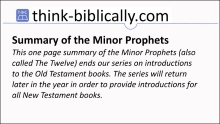
This one page summary of the Minor Prophets (also called The Twelve) ends our series on introductions to the Old Testament books. We sincerely hope this has been fruitful for all our readers and helped them improve their knowledge of the Bible and provided a resource everyone can return to when studying a particular book of the Bible. We will be updating these pages as new information becomes available so be sure to check back for the very latest content. The series will return later in the year in order to provide introductions for all New Testament books.
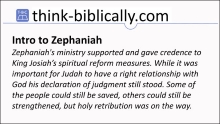
To appreciate Zephaniah's ministry a review of history is helpful. Earlier in the nation of Judah’s life there was a king named Manasseh. He was by far the most evil king to have ruled over Judah, and his reign was longer than any other (55 years). It was during this reign of evil that God gave an irreversible judgment on Judah saying, “I will wipe out Jerusalem as one wipes a dish, wiping it and turning it upside down. I will forsake the remnant of my inheritance and hand them over to their enemies.” 2 Kings 21.2-6 recounts the sins of Manasseh:
